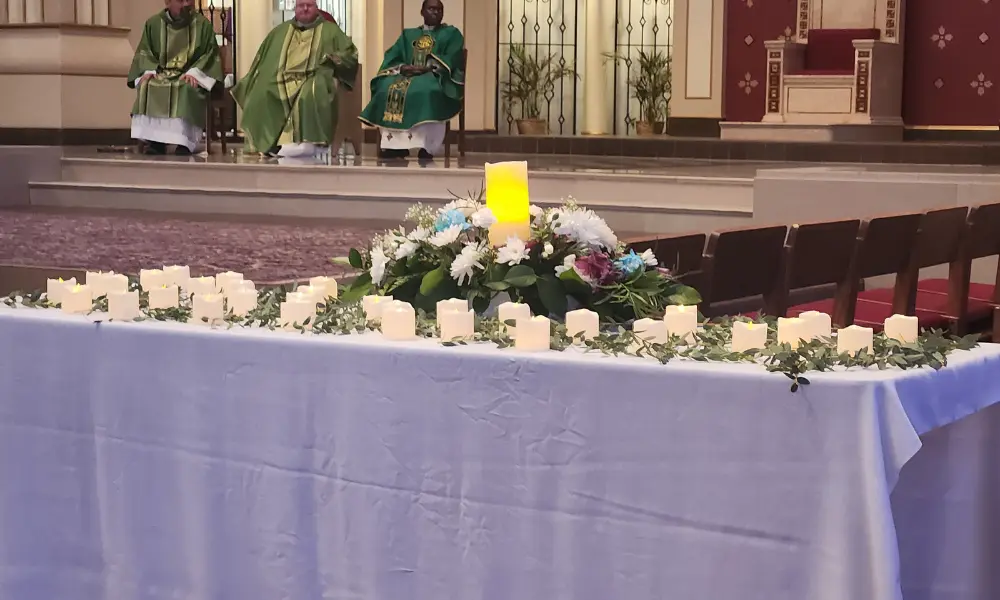Healing Mass focuses on trusting God
September 22, 2024

A Mass of Suicide Healing and Remembrance was held on Sept. 8 at St. Ambrose Cathedral in Des Moines. Families and friends remembered those who died and symbolized commending them to God’s love, mercy, and care.
“In our world today we are surrounded so much by fear, by anxiety, by brokenness, by anger. The list goes on,” said Father David Fleming, the celebrant of the Mass. “The world around us seems to close in on us so often, watching us turn our gaze away from the loving Father, to turn inward to our own brokenness, fear, and pain.”
Suicide is a leading cause of death, he said.
“Perhaps today, in these very powerful stories of healing that we hear in the Gospel, we are reminded again and again and again to trust in God, to trust in his presence in your life and in my life every day,” said Father Fleming.
A tea candle was lit in the name of each suicide victim, and placed on a table near the altar at the cathedral during the Mass.
The Mass springs from a collaborative effort between the Diocese and Catholic Charities during Suicide Awareness Month as a means of offering healing for those who lost loved ones by suicide.
The Catholic Church’s understanding of suicide has evolved over the years. Where it was once not openly talked about and stigmatized families, the Catholic Church now sees it as the outcome of emotional illness.
“Grave psychological disturbances, anguish, or grave fear of hardship, suffering, or torture can diminish the responsibility” of a person who dies of suicide, according to the Catechism of the Catholic Church. “We should not despair of the eternal salvation of persons who have taken their own lives. By ways known to him alone, God can provide the opportunity for salutary repentance. The Church prays for persons who have taken their own lives.”
What’s important to remember is that God’s mercy is there, said Patty Origer, the diocesan coordinator for Persons with Disability Ministry. She had at the Mass 100 copies of a small booklet penned by Father Ron Rolheiser, a syndicated columnist whose articles appear in The Catholic Mirror, called After Suicide: Seven Things For Catholics To Know.
In the midst of grief over the death of a loved one, Father Rolheiser wrote: “But at a different level of understanding, something else will break through that will help us better deal with all those conflicted feelings; namely, empathy for and understanding of someone whose emotional immune system has broken down. And that understanding will also bring with it the consolation that God’s empathy and understanding far exceeds our own.”
The Mass was both for the deceased and for those mourning their loss, said Father Fleming.
“It’s a unique kind of pain and it’s one of the worst kinds of things I’ve ever experienced with parents who have lost a child through suicide because of how it affects survivors,” he said.
Family members question if there was something they could have done to prevent the death and that creates additional brokenness in their lives, he said.
Parishes are encouraged to hold their own Mass of Remembrance, use intercessory prayers to remember those who have died by suicide, or remember them with a display of flowers, candles, or names in a book, Origer said.
How do we move forward, asked Father Fleming in his homily?
Listen to one another, accompany those who are struggling and let them know they are not alone, seek the assistance of others, and stay connected in a relationship of love.
He said: “When you take the Eucharist, you can carry Christ out into the world to others in need.”